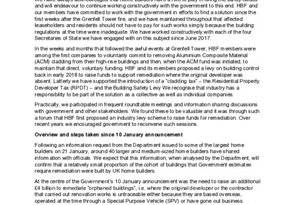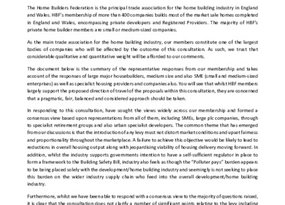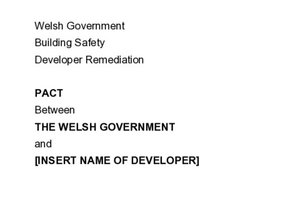Richard Goodman, Director General - Safer and Greener Buildings at DLUHC, has written to residential property developers on the government approach to agreement on building safety.
In the letter, he expressed his gratitude for the returns that have been submitted so far and urged those who have not yet done so to submit before February 7th. He also asked for developers to start creating a fuller return with all 11m+ buildings that have been developed so that the government can match these against their database of buildings that need remediation where they do not have developer information. As part of this process the government will share information on relevant buildings within existing funding programmes to agree how developers can take responsibility. Details on individual buildings will be shared with companies.
Goodman stated that the government will be taking steps to codify the commitments that developers will be asked to make, centred on the two fundamental propositions of the government’s approach, as the Secretary of State set out at his first roundtable. First, developers must commit to remediating those buildings which they themselves played a role in developing or refurbishing. Second, they must provide financial contributions towards a fund which will cover the costs of all other 11-18m buildings with critical life cladding safety defects. The letter also included a key features document which sets out a proposal for codifying these commitments.
The government are open to discussions on how best to develop these commitments, and welcome developers views as they develop the mechanics of the scheme further. They particularly welcome views on:
- the best way of apportioning contributions between participants.
- how contributions should be apportioned over time and related back to demand.
- how best to operationalise and structure the fund.
- how best to ensure a proportionate approach to work, focussed on critical life safety to the benefit of residents.
- Those who agree to fulfil the commitments set out will continue to enjoy the benefits of the Government’s services and support on financing, procurement, planning, building control, housing investment, and industry development and leadership.
Goodman expressed that the government are keen to publicly acknowledge in mid-February the commitments developers and product manufacturers have made to undertake remediation of any building they have played a part in developing. As part of that announcement, the government would also like to reassure leaseholders that those developers who sign up to the arrangements and who are themselves the freeholder will not initiate forfeiture proceedings against leaseholders with respect to charges or costs associated with carrying out remediation works.
The letter can be read in full here.







